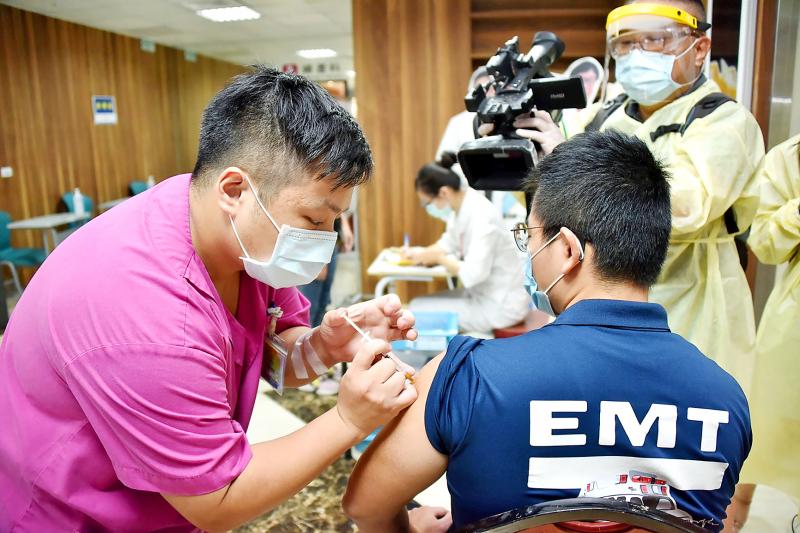Taiwan’s approach to evaluating the efficacy of COVID-19 vaccine candidates has not been used by any other country as a basis for granting emergency use authorization (EUA), Minister of Health and Welfare Chen Shih-chung (陳時中) said on Friday.
During a legislative hearing, Taiwan People’s Party Legislator Ann Kao (高虹安) questioned Chen about review standards for issuing EUAs for domestic COVID-19 vaccines, which the Food and Drug Administration (FDA) published on Thursday.
While Taiwan’s domestically developed vaccine candidates have completed phase 1 and 2 clinical trials, none of them have begun larger phase 3 trials — which are typically the standard for determining efficacy. FDA guidelines allow EUAs to be issued without phase 3 trials, by instead analyzing phase 2 results through immunobridging, which uses the immune response measured in clinical trial participants to infer the overall level of protection a vaccine would provide.

Photo courtesy of the Kaohsiung City Government Department of Health via CNA
Critics say that this approach, which is based on the potency levels of neutralizing antibodies found in clinical trial participants, cannot be used to accurately determine a vaccine’s efficacy.
Kao asked Chen whether Taiwan would be the first country to grant an EUA using immunobridging as a substitute for efficacy data obtained in phase 3 clinical trials.
Initially, Chen said that he could not speak to the approaches being adopted by regulators in other countries, adding that immunobridging has been a topic of discussion in the WHO.
When pressed, Chen said that “there are currently no approvals of this type.”
“If that is the case, then this is genuinely frightening,” Kao said. “Taiwan has purchased 10 million [local] vaccines, enough to give to 5 million people.”
“If the efficacy of the domestic vaccines does not meet expectations, then these people are like the emperor with no clothes — completely without protection,” she said.
Russia and China have approved COVID-19 vaccines for use before they entered phase 3 trials or before efficacy data from those trials had been published, but Taiwan would be the first country to grant an EUA using the immunobridging approach, Chen said.
Debate on the FDA’s standards has grown, following Medigen Vaccine Biologics’ announcement on Thursday that it would soon apply for an EUA, after becoming the first local vaccine maker to “unblind” results of its phase 2 clinical trials.
The FDA’s review would compare the neutralizing antibody potency levels of Medigen trial participants with those from a control group of 200 recipients of the AstraZeneca vaccine in Taiwan, Chen said.
As data from the AstraZeneca group is pending, the EUA review would likely begin later this month, Chen said, adding that there would be no pressure on the FDA and no deadline for when it should be completed.
In a follow-up question, Kao said that the US Food and Drug Administration had publicly broadcast its EUA review meetings for the Moderna COVID-19 vaccine, and asked Chen if Taiwan would be willing to do the same.
Chen said that he would respect whatever decision the vaccine review committee made on the matter, but added that there are no plans to broadcast the proceedings.
If Medigen’s vaccine is granted an EUA and if plans to use immunobridging, with phase 3 trials to be conducted later, gain traction internationally, the vaccine would have a chance of being approved by the WHO, Chen said.
Even without international recognition, Taiwanese would not be prohibited from entering other countries based on what vaccine they receive, although quarantine procedures might differ, he added.

Taiwan has received more than US$70 million in royalties as of the end of last year from developing the F-16V jet as countries worldwide purchase or upgrade to this popular model, government and military officials said on Saturday. Taiwan funded the development of the F-16V jet and ended up the sole investor as other countries withdrew from the program. Now the F-16V is increasingly popular and countries must pay Taiwan a percentage in royalties when they purchase new F-16V aircraft or upgrade older F-16 models. The next five years are expected to be the peak for these royalties, with Taiwan potentially earning

STAY IN YOUR LANE: As the US and Israel attack Iran, the ministry has warned China not to overstep by including Taiwanese citizens in its evacuation orders The Ministry of Foreign Affairs (MOFA) yesterday rebuked a statement by China’s embassy in Israel that it would evacuate Taiwanese holders of Chinese travel documents from Israel amid the latter’s escalating conflict with Iran. Tensions have risen across the Middle East in the wake of US and Israeli airstrikes on Iran beginning Saturday. China subsequently issued an evacuation notice for its citizens. In a news release, the Chinese embassy in Israel said holders of “Taiwan compatriot permits (台胞證)” issued to Taiwanese nationals by Chinese authorities for travel to China — could register for evacuation to Egypt. In Taipei, the ministry yesterday said Taiwan

‘LIKE-MINDED PARTNER’: Tako van Popta said it would be inappropriate to delay signing the deal with Taiwan because of China, adding he would promote the issue Canadian senators have stressed Taiwan’s importance for international trade and expressed enthusiasm for ensuring the Taiwan-Canada trade cooperation framework agreement is implemented this year. Representative to Canada Harry Tseng (曾厚仁) in an interview with the Central News Agency (CNA) said he was increasingly uneasy about Ottawa’s delays in signing the agreement, especially as Ottawa has warmed toward Beijing. There are “no negotiations left. Not only [is it] initialed, we have three versions of the text ready: English, French and Mandarin,” Tseng said. “That tells you how close we are to the final signature.” Tseng said that he hoped Canadian Prime Minister Mark Carney

The US’ joint strikes with Israel on Iran dismantled a key pillar of China’s regional strategy, removing an important piece in Beijing’s potential Taiwan Strait scenario, said Zineb Riboua, a senior researcher at the Hudson Institute’s Center for Middle East Peace and Security. In an article titled: “The Iran Question Is All About China,” Riboua said that understanding the Iran issue in the context of China’s “grand strategy” is essential to fully grasp the complexity of the situation. Beijing has spent billions of dollars over the years turning Iran into a “structural strategic asset,” diverting US military resources in the